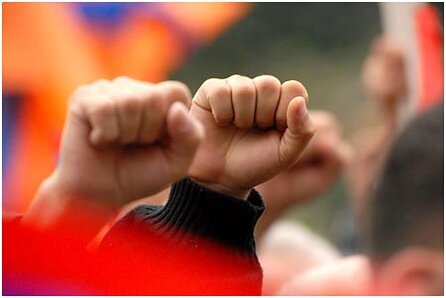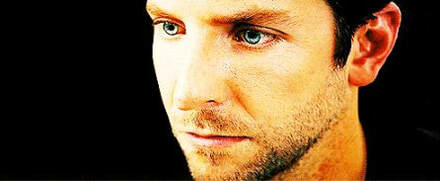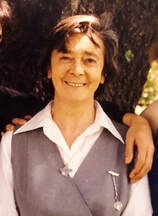|
‘Kairos moments’. Pivotal experiences... I wasn’t trying to be difficult. It felt like an issue of justice. I was in my late teens and this was a trade union meeting in a local town hall. The room was packed full and I sat upstairs in a balcony. The union leaders were in powerful positions, sitting in a row at the front table. Nobody dared to speak or to raise a challenge. To lose membership meant to lose one’s job. ‘We have mortgages to pay and mouths to feed.’ I valued the trade union ideal but, somewhere along the way, this body had lost its visionary, democratic principles. I disliked the way its leaders abused power and traded on fear. After making long, tedious speeches, reminiscent of a bygone communist era, the main leader stood up and asked if anyone had anything to say. A tense and tangible silence filled the room. I could feel my heart pounding and nerves straining throughout my body. I had to say something, I had to speak. So, much to my colleagues’ amazement, I stood up, took a deep breath and advocated a proposal for democratic reform. The whole room gasped…then fell back to stunned silence. The leader, now red with rage, shot me down for daring to challenge his authority – and inadvertently proved my point. I was treated like a hero as I left that day, work mates crowding around, punching my shoulders and patting my back with looks of surprise and admiration. It was a defining moment for me. I had stood up to authority, taken a public stance on my beliefs and values and, by God’s grace, managed to stay diplomatic and assertive. There could be no going back now. I organised a union-wide petition and, as a result, came under threat from union reps who warned me that I was ‘playing with fire’. I resigned, left my job and entered human rights and community development work. I can see a trajectory in my life that had led up to that point, e.g. from when, as a young school boy, I had hated bulling and cruelty to animals and had created an animal rights activist group at school. I can also trace a clear trajectory through my life and career in subsequent years, e.g. in leadership, coaching and OD roles in charities and INGOs, based on my spiritual-existential-humanistic beliefs and values. I still hold that same passion to support people who are poor, vulnerable or oppressed in the world. What have been the defining moments in your life and career? How did you get here? How can I help you work out your career-calling? Get in touch! [email protected]
12 Comments
‘Spontaneous counter-intuition.’ Those odd moments when, out of the blue, we find ourselves, suddenly and unexpectedly, acting radically-contrarily to our normal thinking patterns and behaviours – and yet with near-miraculous results. Have you ever experienced such a moment? What happened? What sense do you make of it? 'If you give children a problem, they may come up with a highly original solution, precisely because they don’t have the established route to it.’ (Edward de Bono) It was dark as I meandered through heavy, stationary traffic on my trail bike, trying not to be dazzled by headlights of on-coming cars. Suddenly, I noticed the strange shadowy figures of two men, one man attacking the other, punching him violently in the face against his car. Feeling like Bradley Cooper on NZT in Limitless, I pulled over fearlessly and strode towards them. I flipped up my visor, approached the aggressor, held out my arms in open gesture and asked, compassionately, if he was OK. He looked confused, stopped and skulked away. The other man, still propped against the side of the car with face covered in blood, thanked me profusely with breathy, gasping voice, ‘You saved my life.’ Now coming to my senses, as if waking up from sleep, I think I felt almost as surprised and relieved as he did. What on earth had just happened? How is it that I had acted so counter-intuitively in the moment and, in doing so, had ended the assault rather than escalated or become embroiled in it? I felt both stunned and amazed as I helped the man back into his car. It felt like a miracle. Edward De Bono coined the phrase, Lateral Thinking, to describe an approach to innovation and problem-solving that involves use of creative techniques that disrupt normal thinking patterns and stimulate fresh ideas. His ingenious methods helped to solve the human-psychological problem, ‘How can I think out of the box when I am the box?’ They help to break the frozen gaze, the ‘fixed Gestalt’, the mental webs of our own creation that become so entrapping for us (Gareth Morgan). And he made it possible to learn how to do it too. Yet how do we account for moments of instinct, of intuition, where we act, apparently laterally, without thinking, without conscious process of reasoning or decision-making? This looks and feels qualitatively different to lateral thinking, even if the results of it may appear so similar. How do we make sense of that sudden dream-like state, that doing the wildly unexpected thing that feels strange and unfamiliar, even to us? Is it something that we can learn, pray for, prepare for, especially in readiness for sudden crises? What do you think? Can I help you develop critical reflective practice? Get in touch! [email protected] ‘We are always influencing, but not always in the way we hope.’ (Richard Marshall) We do well not to underestimate the power of role-modelling. Who has most influenced your thinking and practice? What are you role-modelling for people you work with? I remember that night vividly. I was alone at an event in St James’ Church in London, an event aimed at raising support for Central American refugees in the UK. I was, serendipitously, sitting next to the Nicaraguan ambassador. At the end of the evening, a group of refugees went forward for a photo shoot. They were being guided and directed by a vivacious woman wearing a nun’s habit who, with warm, wide smile and open arms, gestured me forward to join them. I felt humbled to be invited. This was my first encounter with Sister Isabel. With five degrees and a PhD to her name, this truly remarkable Spanish woman, who worked as a psychotherapist with traumatised people, became a close friend and inspiration in my life. We met up regularly to chat, discuss, argue, laugh, support and encourage each other in our respective work. She reached out persistently beyond the strict boundaries of her formal role to touch people’s hearts and lives with love. Last night…she died. So today I feel a strange emptiness. Wordless, struggling to find words to pay tribute to a life that left such a mark on my life. But I don’t want to be silent. Isabel would say all that matters is Jesus, yet I want to show a glimpse of her spirit too. When we met, I was working with a Central American political action organisation. She challenged its revolutionary spirit: ‘You are willing to fight for the people but are you willing to die for them?’ Disconcerted faces all round. She would be – literally. True to this point, she travelled to Latin America to work with students who were suffering torture under a brutal dictatorship. It was a harrowing experience and she returned even more convinced: ‘My therapeutic training could only take me so far. What these people needed more than anything was love.’ Later, she had a stroke that left her partially-paralysed, yet she limped on with her work with determined patience and conviction. Her final prayer: ‘I’m ready to go now, to be with Jesus.’ What a woman. What an inspiration. Sister Isabel Maria Montero
‘The problem is, we are protecting people when we should be preparing them.’ (Carole Pemberton) How to weather a storm. Resilience has become a buzz word in organisations today, linked with well-being, positive risk, agility, adaptivity and sustainability. As an individual-personal level, the imperative is being driven by a growing awareness of and concern about mental health issues, experiences, influences and impacts, including in the workplace. At a wider organisational level, factors include ever-more complex global dynamics and a seemingly relentless need for change. All in all, it can feel like a perfect storm – leaving leaders, managers, people professionals and staff alike feeling perplexed and exhausted. I worked recently with a forward-thinking public sector organisation in the UK. It was and is working through a merger with two sister organisations and recognised the criticality of building resilience by preparing leaders, staff and teams psychologically in advance for the transitions that this would entail; as well as to manage the practical change process itself effectively. I will share insights and ideas here that participants said they found most useful. We framed the experience as moving from an until-now-known reality to a not-yet-known future reality, through what sometimes may look-feel like a messy place in the middle. 1. Scary voids. In the absence of knowing exactly what a change and new future may hold, some people will fill the interim void with anxiety; others with hope. It’s normal – and partly influenced by what each person has experienced in the past. Hold your nerve. Reach out if you – or others – need help. 2. Small things are big things. In the midst of change and transition, the most insignificant of decisions and actions can take on great symbolic significance – positively or negatively. Don’t be surprised if this happens. Ask each other what small thing(s) would make the biggest positive difference – then, if possible, do it. 3. Mind games. People, teams and organisations construct narratives that help them make sense of their experience. Pay careful attention to the stories that you and other people tell yourselves – and each other – on route. Change the narrative: change the experience. 4. Rollercoasters. Transitions can feel like a bumpy ride, often feeling more like a ‘snakes and ladders’ game than a smooth change curve. Be patient, flexible and forgiving. One step at a time. 5. Building blocks. Reflect and help others reflect on life-work changes that have worked out well in the past – and how. Engender resourcefulness. Inspire hope. How do you develop personal, team and organisational resilience? Can I help you develop greater resilience? Get in touch! [email protected] Tuesday night. A close friend in Asia discovers she is in terrible financial debt through no fault of her own. She has supported a near relative through her studies at considerable personal cost and the relative has let her down badly. I ask her to ask the bank how much she needs to clear the debt. Wednesday night. She tells me, UK equivalent, £1000. She says, ‘Let’s pray.’ I agree. Thursday night. A biker in the UK who I don’t know well calls me and asks if I can meet him at a biker/truck stop café on Sunday morning. I wonder if I have inadvertently done something to upset him. I agree to meet. Sunday morning. He’s waiting at the table and I sit down, nervously. He asks, ‘That girl in Asia you once spoke about trusts Jesus, right?’ ‘Yes’, I reply. He slides an envelope across the table towards me. Now I am puzzled. He says, ‘Jesus told me to give her this – as soon as possible. Can you send it to her?’ Intrigued, I say, ‘Yes.’ He continues, sternly. ‘This is nothing to do with me. It’s between her and Jesus. I don’t want to hear about it again.’ I slide the envelope into my pocket, thank him and leave. At home, I open the sealed envelope. £1000 inside in crisp, new bank notes. I am speechless. I don’t know about you, but this type of encounter, this kind of experience leaves me stunned and amazed. It has happened to me on quite a few occasions in my life and I’m convinced it lays beyond ordinary, rational explanation. I’m going to be brave here and to call it a miracle. It’s unpopular in contemporary secular culture to talk about God or the super-natural in the context of work and I’m not going to get all religious because that would be inappropriate and annoying. I am, instead, hoping to provoke an open spirit of curiosity. Have we thrown out the baby with the bath water? I remember reading Holloway’s book, Spirituality & Social Work (2010) and Mathews’, Social Work and Spirituality (2009) which re-introduced questions of faith and spirituality into domains where such considerations had effectively and, I would argue, over-hastily been dismissed as irrelevant. Having reacted rightly against ‘religion’ in its worst, oppressive forms, I detect a fresh openness to consider Who or what may lay beyond the boundaries of empirical science; especially when working with people and cultures for whom life-giving faith and spiritual dimensions are fundamental. As leader, coach, OD or trainer, what role, if any, do faith and spirituality play in your practice? How do you work effectively with people and cultures who consider them critical? Have you ever seen or experienced something that caused you to question everything you had believed was real and true? Get in touch! [email protected] |
Nick WrightI'm a psychological coach, trainer and OD consultant. Curious to discover how can I help you? Get in touch! Like what you read? Simply enter your email address below to receive regular blog updates!
|









 RSS Feed
RSS Feed